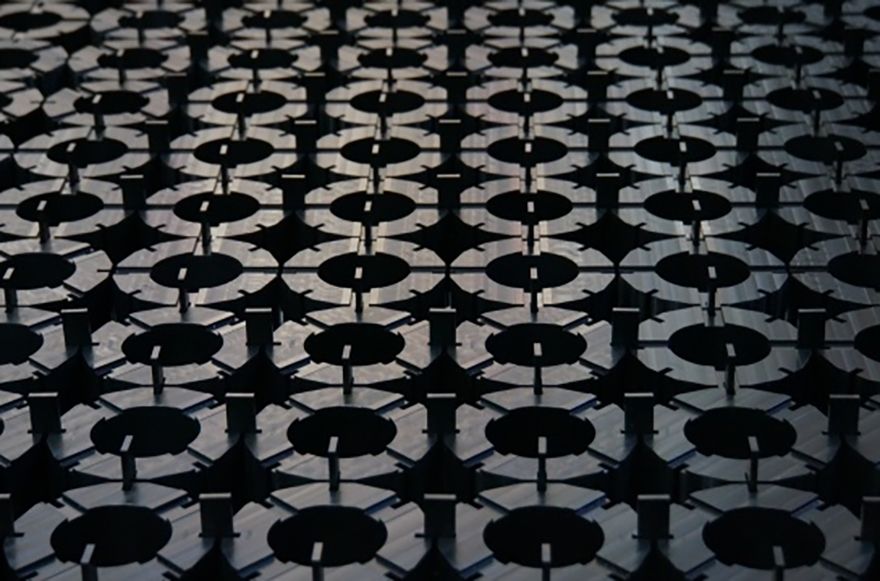 Nuclear graphite blocks in reactor cores. Photo: EDF Energy
Nuclear graphite blocks in reactor cores. Photo: EDF EnergyThe
University of Manchester has been awarded a £13 million grant to lead a new programme aiming to transform the lifecycle of graphite in nuclear energy — an essential material for the future deployment of nuclear power. The award brings together world-leading expertise led by the university in collaboration with the Universities of
Oxford,
Plymouth, and
Loughborough.
Nuclear energy is a key ingredient in the UK’s ‘net zero’ goals as it emits nearly zero CO
2 or other greenhouse gas emissions – but it does come with challenges. The five-year ENLIGHT programme (Enabling a Lifecycle Approach to Graphite for Advanced Modular Reactors) will develop critical technologies to support the deployment of next-generation nuclear energy technology and will address two of the UK’s most pressing nuclear challenges — securing a sustainable, sovereign supply of nuclear graphite and finding solutions to manage the country’s growing volume of irradiated graphite waste.
The project is supported by an £8.2 million grant from
UK Research and Innovation’s Engineering and Physical Sciences Research Council (EPSRC), higher education institutions, and around £5 million of contributions from industry partners. The programme of research, collaboration, and skills development aims to secure the UK’s position at the forefront of nuclear innovation and as a global leader in advanced reactor technology and clean-energy innovation.
Principal investigator Professor Abbie Jones, chair in Nuclear Graphite at the University of Manchester, said: “Nuclear graphite plays a vital role in the safety and efficiency of advanced reactors, yet the UK currently relies on overseas suppliers for this material. ENLIGHT will lay the foundation to re-establish a UK-based graphite supply chain while developing sustainable solutions to recycle and re-use irradiated graphite – transforming a growing waste stream into a valuable resource. This programme will reduce waste, strengthen energy security, and support the country’s ‘net zero’ ambitions.”
Critical componentGraphite is a critical component in many next-generation Advanced Modular Reactors (AMRs), including High Temperature Gas-cooled Reactors (HTGRs) and various Molten Salt Reactor (MSR) designs - technologies key to achieving the UK’s ambition to deliver 24GW of new nuclear power by 2050. The material accounts for around one-third of reactor build costs, yet despite its importance, the UK currently relies entirely on imports to meet demand. With the existing Advanced Gas-cooled Reactor (AGR) fleet approaching decommissioning by 2028, and more than 100,000 tonnes of irradiated graphite already in storage, ENLIGHT will pioneer new approaches to both recycling legacy material and producing new, sustainable high-performance graphite suitable for future AMRs.
Dr Greg Black, senior advisor at the Environment Agency, said: “We look forward to participating as a partner in the ENLIGHT programme. As the environmental regulator for the nuclear industry in England, we consider the ambitions of ENLIGHT on 'sustainable graphite' aligns with our Regulatory and RD&I areas of interest.”
The programme will focus on three strands of work: Sustainable Graphite – developing processes for decontaminating, recycling and re-using irradiated graphite from AMR deployment; Graphite Selection and Design – developing new graphite materials engineered to withstand extreme conditions in AMR environments; and Graphite Performance – understanding how these new materials behave in novel AMR conditions to improve its lifespan. These advances could save the UK up to £2 billion in future waste management costs and offer a pathway to strengthen the UK’s unique position as a global hub for graphite research and innovation.
ENLIGHT will also focus on skills development to expand the national graphite research community and train the next generation of graphite scientists and engineers essential to the UK’s clean energy future. Home to the
Dalton Nuclear Institute and a core partner in the
Henry Royce Institute, the University of Manchester is uniquely positioned to lead the ENLIGHT programme. The university brings together cutting edge facilities from the Irradiated Materials Laboratory and the Molten Salts in Nuclear Technology Laboratory.
ENLIGHT will also build on Manchester’s role in flagship activities and initiatives including, the Nuclear Waste Services Research Support Office, the SATURN Centre for Doctoral Training in Nuclear Energy, Robotics and AI in Nuclear (RAIN) and Robotics and AI Collaboration in Cumbria (RAICo).